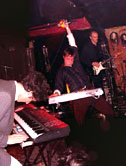
Comment
on this story
What:
Flux Information Sciences with the Melted Men
When:
Wednesday, Dec. 12 at 9 p.m.
Where:
Pilot Light
|
|

Flux Information Sciences plays post-modern rock
by Matthew T. Everett
Tristan Bechet and Sebastien Brault were in art school in France in 1996 when they happened to see the annual report for a large information technology corporation called Volt Information Sciences. The company develops communications and information technology and sells it to other corporations, but has no retail outlets. The document was a revelation; Bechet and Brault became fascinated by the company, which has worldwide influence but no public face.
Both Bechet and Brault were already interested in experimental performance art. They played together in the confrontational avant-garde rock band TWA and were both studying post-modern art theory at the Beaux Artes in Provence. They wrote a proposal for a joint enterprise with Volt Information Sciences: The pair would tour, funded by Volt, performing music with Volt electronic equipment, acting as a paid infomercial for the company by demonstrating their technology. Volt executives eventually met with Brault and Bechet; but, instead of signing a contract, the pair quickly realized just how surreal their proposition was.
"The experience with Volt was like getting lost in a Quixotic maze of ideas," Brault writes in an email interview. "We met with the CEO and lawyer of Volt at the 48th floor of the McGraw-Hill Building overlooking the corporate skyline of NYC with a tape recorder and a project proposal. The meeting was both exhilarating and ridiculous. We had a thorough discussion on the project and they listened to our ridiculously lo-fi tape recording in all earnestness. In essence their response was similar to that scene in the movie Network where the corporate king says, 'You are fucking with the natural order of the universe.' Apples and oranges...
"It was never explicitly critical, just as the Volt project was never ironic. On the contrary, we are frankly fascinated by the corporate culture, and with the Volt project we were trying to infiltrate it, become insiders. Now that we have realized that we don't fit in, the perspective has changed and we certainly are more visceral about it, and more confrontational. But we aren't rejecting it or criticizing it, although we have passionate reactions to it. It's the world we live in."
After their proposal was dismissed, Brault and Bechet decided to stay in New York and do the project on their own under the name Flux Information Sciences. They played galleries and lofts and clubs in the Bowery, assaulting audiences with a mix of noise, synthesizer bleeps, samples, and corrosive basic rock. The Village Voice describes their shows as "monstrous," and claims they may be the best live band in the city.
Following a couple of low-budget recordings, Brault—who plays synthesizer and manipulates samples—and Bechet—guitar, keyboards, and the guttural howls and moans that pass for vocals—were joined by bassist Chris Pravdika (formerly of Gunga Din) and drummer Siobhan Dufy (formerly of Gunga Din and God Is My Co-Pilot). "Since Siobhan and Chris joined, we are as much a band as a band gets," Brault writes, dismissing a characterization of the group as a performance art collective.
"When I was studying piano I was immersed in a classical world of highly civilized ambitions and ever challenging technical difficulties," Brault says. "I think this was a very strengthening experience. But now I think that all the difficulties of being so civilized are superfluous. I kept the ambition and the perseverance. And in the end, the music we're doing now is just as challenging, but not for some technical reason, which is good."
Their most recent recording, Private/Public, was released last year, before Dufy and Pravdika joined the band. Most of the disc is throbbing, industrial noise, contemporary rock eviscerated and stripped down to its most essential components, and then turned up loud. But there are passages of dark beauty, like the short song "Demise," with Bechet singing in an incisive, high-pitched whine over a thin suite of minor-key synthesizer chords.
Private/Public is a difficult 45 minutes. Even the starkly pretty moments, like "Demise," are disturbing, and the repetitive and impersonal bleeps and grunts drain the listener. Only the droning four-and-a-half-minute "Love," which builds from an almost inaudible hum into a sweeping, epic wall of keyboards and a melodic bass line, and the brief, lilting lullaby "Model Man," are conventionally pretty. But the ugliness is offset by biting, off-kilter humor. And, after a few listens, the dirty rock grooves of songs like "The Shocking Truth" and "Adaptech" begin to stand out from the collage of blips and electronic clangs.
But, as their name implies, the finished product isn't nearly as important as the process. Flux Information Sciences is primarily a live band. In performance, they can reinvent everything they've already done, and say something new each time.
"After the Volt project failed, we just kept on doing music, but freed from the context of this intricate project," Brault writes. "The music became more of a means of its own...There is a strong searching dynamic in what we do, compared to what traditional bands do. In essence, for us music is not a given means of expression, but one to invent and discover through what we need to express. We end up in places that are very atypical."

December 6, 2001 * Vol. 11, No. 49
© 2001 Metro Pulse
|